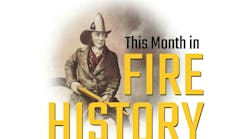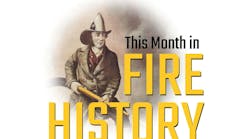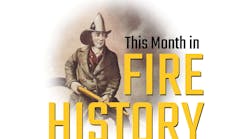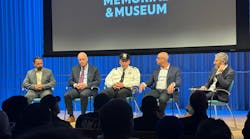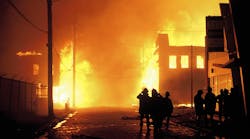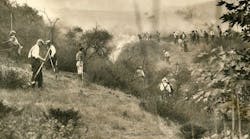A decade is a long time, but at the same time it seems like yesterday in Worcester. Some in the rank and file are ready to move on. Never forget the losses the department suffered on Dec. 3, 1999, but stay focused on the future.
Fire Chief Gerard A. Dio has been the leader of the department for all of the anniversaries of the event, having served as Deputy Chief at the time of the fire in the Worcester Cold Storage and Warehouse Co. He was there the night of the fire. He did the internal investigation. He’s lead the department though some challenging times as it regrouped and rebuilt. And, he’s been at the helm to help build a new station and a memorial for the fallen brothers. Ten years later, Chief Dio took a bit of time in the midst of all the ceremony preparation, to reflect on the firefighters who gave all and how the department has evolved.
As the 6:13 p.m. alarm came in, it was a Friday night and Dio and his wife were going out. As the deputy, he was called in on the third-alarm of the fire which soon went to five alarms.
“I said to my wife, ‘Let me go take care of this and I’ll be back,’” Dio said.
He jumped into his car, turned on the portable radio and couldn’t believe his ears; he heard the guys calling for help.
“I thought, ‘What’s going on here?’” he said, remembering he pulled into the Grove Street station headquarters and checked in. “I said, ‘Is it true?’” “Yeah chief. They’re having a hard time finding them,” Dio recalled.
He changed into uniform and gear, checked in at the scene and learned from then-chief Dennis Budd that two guys were missing. He couldn’t believe his ears and assured himself everything would be OK.
“We’ve had issues before,” he said. “…Guys end up popping out an air conditioning unit and got out and it worked out fine. So, in the back of my mind, I’m think they’ll be popping out any minute and it will be fine. We’ll put the fire out and everybody will go home. It didn’t happen that way.”
Indeed it didn’t happen that way at all. Six were lost that night: Paul Brotherton, Timothy P. Jackson Sr., Jerry Lucey, James F. “Jay” Lyons III, Joseph T. McGuirk, and Tommy Spencer.
Dio had known all six personally and professionally for years and speaks fondly of each, remembering their hobbies, their families, their dedication. He remembers one thing most of all – they were all young, too young to die.
“You do not believe it,” Dio said of the tragic news. “That’s the biggest thing. At that point I had been on for 20-something years and there’s nothing that had ever been anything like it. It seems like it was surreal. You could have pinched me and I wouldn’t have felt it. …They all died too soon.”
He said the guys who died were dedicated, experienced firefighters the department could count on to jump right in.
“They were all workers,” he said. “In the fire service, you got guys that give 100 percent all the time and this was the type of fire where the guys who gave 100 percent died. It wasn’t a fluke collapse. They were in there working the job they always did.”
Whether it was, as Dio described, “The nickel and dime fire or the million dollar fire, they were in there, getting dirty and loving it. Those are the type of characters, the nature of them, they were firefighters. They were jakes, not door holders.”
Dio figures a full third of the firefighters who were employed by city at the time are no longer part of the crew.
“A lot of the guys who helped us recover the bodies, they’ve died since,” Dio said. “Heart attacks, a plane crash, car accidents, suicide. Since this, we’ve lost a lot of guys who were there. …We’re down a third of the department and in the next 10 years, there will be very few left.”
After the recovery, the memorials, the funeral and the mourning, Dio was left with the task of rebuilding the department, listening to people, creating new programs, getting new equipment and changing the way the department did business.
The department purchased 45-minute SCBAs, got more thermal imaging cameras – there are 10 total in the department now—and trained firefighters in self preservation.
“If we are sending these guys into buildings, they should be provided with protective gear and equipment to help them protect themselves,” Dio said. “ If you expect us to save you in a time of need, give us the tools and equipment to protect ourselves.”
The cold storage building fire shone a spotlight on Worcester and helped raise the needs of the fire service to a national level. Dio said the federal Fire Act Grant started, in part, because of the tragic losses of the six firefighters.
“The men did not die in vain,” Dio said. “It helped change the way people think about fire and insurance. Prior to this, it was a local issue. This incident woke people up to the fact that it’s more than a local issue. …Fire protection is a national problem.” He added that before the Worcester fire, there wasn’t much federal money allocated to fire departments, as little as $5 million nationwide and now, with the multiplier effect of the attacks on Sept. 11, the feds award money in the billions, he said.
But back then, money was scarce for fire departments. Dio recalls the decision to build a new fire station at the site and the need for the funds to do so. He butted heads with then Gov. Mitt Romney who vowed he wouldn’t give Worcester $2 million for a new fire station.
Dio and local representatives worked for, and won, a legislative override of the Governor’s decision and Worcester was given the funding for the new station on Franklin street which was dedicated and opened last November.
The site is also home to a fire department-created memorial to the fallen firefighters. Department funds and contributions made it possible.
Dio said he knew something had to be done with the property and permanently. “I wasn’t going to let it become some parking lot or something. We’ll be at that station for the next 200 years.”
And he said it’s a fitting way to remember the Worcester Six – having a fire station on the hallowed grounds.
“It’s like we’re keeping watch on the property and the guys do an immaculate job,” Dio said. “The place always looks nice. …It’s where the guys died. It’s where they would feel comfortable. It’s like they’re with us all the time now.”
